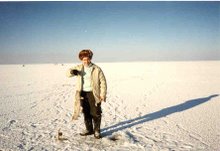de Waal on Anna Politkovskaya
Thomas de Waal is, in my view, the finest reporter on issues relating to the Caucasus region. I admit that I never read much of Anna Politkovskaya's work in the original; what I knew of her writings was largely due to Mr. de Waal.
I urge anyone interested in these issues to seek out his work. One place it can be found is in the archive section of the London Review of Books.
http://www.guardian.co.uk/print/0,,329598616-103677,00.html
The Chechen silence
Anna Politkovskaya's death should awaken us to the vicious injustices in the north Caucasus region
Thomas de Waal
Thursday October 12, 2006
Guardian
The murder of the journalist Anna Politkovskaya leaves a terrible silence in Russia and an information void about a dark realm that we need to know more about. No one else reported as she did on the Russian north Caucasus and the abuse of human rights there. Her reports made for difficult reading - and Politkovskaya only got where she did by being one of life's difficult people.
Since 1999 she had made dozens of trips to Chechnya and the surrounding regions, reporting on the bombings, torture camps, abductions and corruption in Moscow's second campaign in Chechnya. With the rest of the Russian media toeing the official line and western journalists as good as banned from the warzone, it felt at times that our news from Chechnya came from a remarkable one-woman reporting operation. It was scant consolation to her that she received a shelf full of western journalism prizes. Politkovskaya seemed mainly interested in the award ceremonies as a forum for reminding westerners to do something about Chechnya - she was generally disappointed.
Recently the war has ebbed, and President Putin has more or less succeeded in decimating the separatist rebel movement. War-weariness has taken hold. Much of Chechnya is peaceful, and work is finally being done to reconstruct the city of Grozny.
But there is still plenty of reason to worry. Politkovskaya was the first journalist to probe deeply into Putin's weapon of enforcement in Chechnya: a vicious government, led by the pro-Moscow prime minister, Ramzan Kadyrov, that is accountable to no one. People disappear in the night, and Kadyrov's security forces are the suspects. Kadyrov - who has expressed regret at Politkovskaya's murder - was her special bete noire. "Kadyrov must be put on trial," she said firmly the last time I saw her, at a conference in Sweden three weeks ago.
And as Politkovskaya's reports illustrated, if Chechnya is quieter, the rest of the north Caucasus is more disturbed. Unemployment is high, local elites are corrupt, and political violence, often with an Islamic tinge, is on the rise.
With her keen vision, Politkovskaya correctly identified that the central issue here - the flaw at the heart of Putin's Russia - was one of impunity and of the thousands of people who have no recourse to justice when their rights are abused. In Sweden I heard her talk about the dozens of young men who had been "designated as terrorists" in fabricated court cases in the north Caucasus. No one defends them properly in court and they are now serving long, pitiless sentences in Russian prisons. If they ever get out, they will be natural converts to revenge and political violence.
There is a wider justice deficit in Russia. Officials like to point out that Russia is now part of the European justice system, with its courts all answerable to Strasbourg. This is good news - but in the past year lawyers and family members of Chechens who have successfully challenged the Russian government in the European court of human rights have been intimidated and threatened.
Justice needs champions, and Politkovskaya had reported on the mysterious deaths of some of those who dissented publicly from Russia's authoritarian trends. The list was already too long. Two liberal Russian MPs, Galina Starovoitova and Sergei Yushenkov, have been assassinated. In Chechnya the remarkable village head Malika Umazheva, who tried to defend her villagers against death squads, was murdered. Politkovskaya reported on her case with passion and precision. Now the messenger is dead, brutally silenced by the very thing she warned so eloquently about.
· Thomas de Waal is the Caucasus editor at the Institute for War and Peace Reporting, and the author of the introduction to Anna Politkovskaya's book A Dirty War

2 comments:
Excellent post. Thanks for the heads up on finding other articles by De Waal.
Glad you liked it, Jams.
Post a Comment